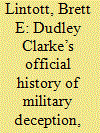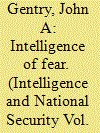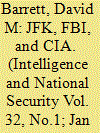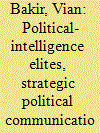|
|
|
Sort Order |
|
|
|
Items / Page
|
|
|
|
|
|
|
| Srl | Item |
| 1 |
ID:
149466


|
|
|
|
|
| Summary/Abstract |
The Japanese decision to surrender on 15 August 1945 created an extraordinary and unique situation in the Chinese province of Manchuria. Within hours of the Japanese surrender, a number of special American intelligence teams parachuted into Manchuria to gain information on the POW’s and Soviet intentions for postwar Asia. This paper will examine on what occurred when Soviet and American military personnel met in Manchuria. Both sides had very different goals and aims for the end of war. For the small American force assigned to locate and identify Allied POW’s, their mission exemplified the already strained relations between the United States and the Soviet Union. For nearly every instance of cordial and joyous meetings between the two sides there were equally difficult confrontations and misunderstandings. These encounters offered a preview into the coming Cold War in Asia.
|
|
|
|
|
|
|
|
|
|
|
|
|
|
|
|
| 2 |
ID:
149471


|
|
|
|
|
| Summary/Abstract |
In counterinsurgency, agent networks are double-edged swords. They are useful tools for degrading insurgent influence and protecting the population. However, they also endanger the population in some ways, as we have seen with mass executions of suspected agents and agent misdirection of raids. Identifying how/why this occurs is critical for developing intelligence practices to more effectively implement COIN strategies. This exploratory study uses three recent counterinsurgency cases – for which significant secondary open-source agent network documentation is available – to identify, describe, organize and analyse patterns of noncombatant-targeted violence associated with human intelligence networks. Identified cases of noncombatant-targeted violence in Operation Enduring Freedom – Afghanistan, Operation Iraqi Freedom, and the – Israeli–Palestinian conflict are used to develop a theoretical framework that models intelligence-related violence incentivization, which also draws from theoretical literature on human intelligence, civil war violence, police states, community policing, and the sociology of betrayal.
|
|
|
|
|
|
|
|
|
|
|
|
|
|
|
|
| 3 |
ID:
149469


|
|
|
|
|
| Summary/Abstract |
What explains variation in the depth of intelligence sharing? Realism provides the standard answer: shared threat motivates deeper cooperation. In a recent article, Ryan Bock offers a liberal antidote to this conventional view, leveraging insights on domestic regime type to explain why Anglo-Soviet sharing remained shallow despite the German threat during 1941–5. Several shortcomings in Bock’s innovative study undermine his main arguments and findings. A reevaluation of the Anglo-Soviet case and a cursory examination of nine other intelligence-sharing relationships during the Second World War reveal a spread of variation in the depth of cooperation that cannot be explained by a liberal regime-type argument, a realist threat perspective, or other prevailing International Relations paradigms. Marrying insights from interdisciplinary scholarship on gossip and embedded exchange, we propose a novel alternative framework that suggests plausible solutions to puzzles left behind by other accounts, thus opening a new line of inquiry for future research on intelligence cooperation.
|
|
|
|
|
|
|
|
|
|
|
|
|
|
|
|
| 4 |
ID:
149468


|
|
|
|
|
| Summary/Abstract |
This article analyses an episode in the development of intelligence official history in Britain. While an official history of intelligence in the Second World War was not approved until the 1970s, the idea had been pursued seriously in 1945 by Brigadier Dudley Clarke. Clarke had been the chief of deception operations in the Mediterranean theatre, and wanted to develop an official history and film recounting some of the exploits of his unit. This article argues that Clarke’s proposals, which were ultimately rejected by the Joint Intelligence Committee and the Chiefs of Staff, showed a prescient understanding of the power of official history, recognized that complete secrecy would be counter-productive, and are thus an important early milestone in the evolution of intelligence official history.
|
|
|
|
|
|
|
|
|
|
|
|
|
|
|
|
| 5 |
ID:
149465


|
|
|
|
|
| Summary/Abstract |
Intelligence agencies long have brought unwelcome news to civilian political and military masters – and sometimes suffered severely for it. Even in Western democracies, insecurities and outright fear produce behavioral responses by individuals and defensive institutional reactions that distort normal intelligence activities and affect the overall performance of intelligence agencies. Causes of fear include: political leaders, overseers, agency managers, and the security elements of their organizations. This article highlights the importance of institutional factors, especially organizational cultures and incentives, on the activities and overall performance of intelligence agencies and suggests that motivated biases, caused by personal and organizational self-interest and fears, are more significant causes of intelligence failures than are commonly believed.
|
|
|
|
|
|
|
|
|
|
|
|
|
|
|
|
| 6 |
ID:
149467


|
|
|
|
|
| Summary/Abstract |
On 26 July 1962, the New York Times published a front-page story by reporter Hanson Baldwin which, among many things, showed the vulnerability of Soviet land-based missiles, in the event of a first strike by the US. Drawing at least indirectly from a National Intelligence Estimate, it also showed how US intelligence had obtained that information. The story infuriated President John F. Kennedy, who believed it harmed the security of the United States. This article details an aggressive FBI investigation of who had leaked to Baldwin, as well as an initiative at the Central Intelligence Agency to conduct its own future leak investigations inside the US, both authorized by President Kennedy.
|
|
|
|
|
|
|
|
|
|
|
|
|
|
|
|
| 7 |
ID:
149470


|
|
|
|
|
| Summary/Abstract |
This article explores whether the contemporary press adequately holds political-intelligence elites accountable when facing Strategic Political Communication (SPC) during those long periods when whistle-blowers are absent (‘journalism-as-usual’). It develops an original benchmark of public accountability demands of political-intelligence elites that the press should be capable of making, thereby providing concrete discursive strategies to facilitate this difficult task. Demonstrating its utility, this benchmark is used to evaluate press oversight during journalism-as-usual and facing Obama administration political-intelligence elite SPC on the Central Intelligence Agency’s Detention and Interrogation Program. This shows that manipulation of the contemporary press occurs through subtle, but effective, SPC techniques involving a certain style of information provision that influences national, international, mainstream and alternative press outlets’ accountability demands.
|
|
|
|
|
|
|
|
|
|
|
|
|
|
|
|
| 8 |
ID:
149464


|
|
|
|
|
| Summary/Abstract |
Michael Herman is a pioneer of the academic study of intelligence. His career spans the worlds of intelligence and academia in the United Kingdom, and has done much to bring the two closer together. Born in 1929, Michael was educated at Scarborough High School before securing a scholarship to read Modern History at Queen’s College Oxford, in 1946. His studies there were interrupted by two years’ National Service between 1947 and 1949, when Michael served in the Intelligence Corps in Egypt. He then returned to Oxford to complete his studies and was awarded a First Class degree.
|
|
|
|
|
|
|
|
|
|
|
|
|
|
|
|
|
|
|
|
|